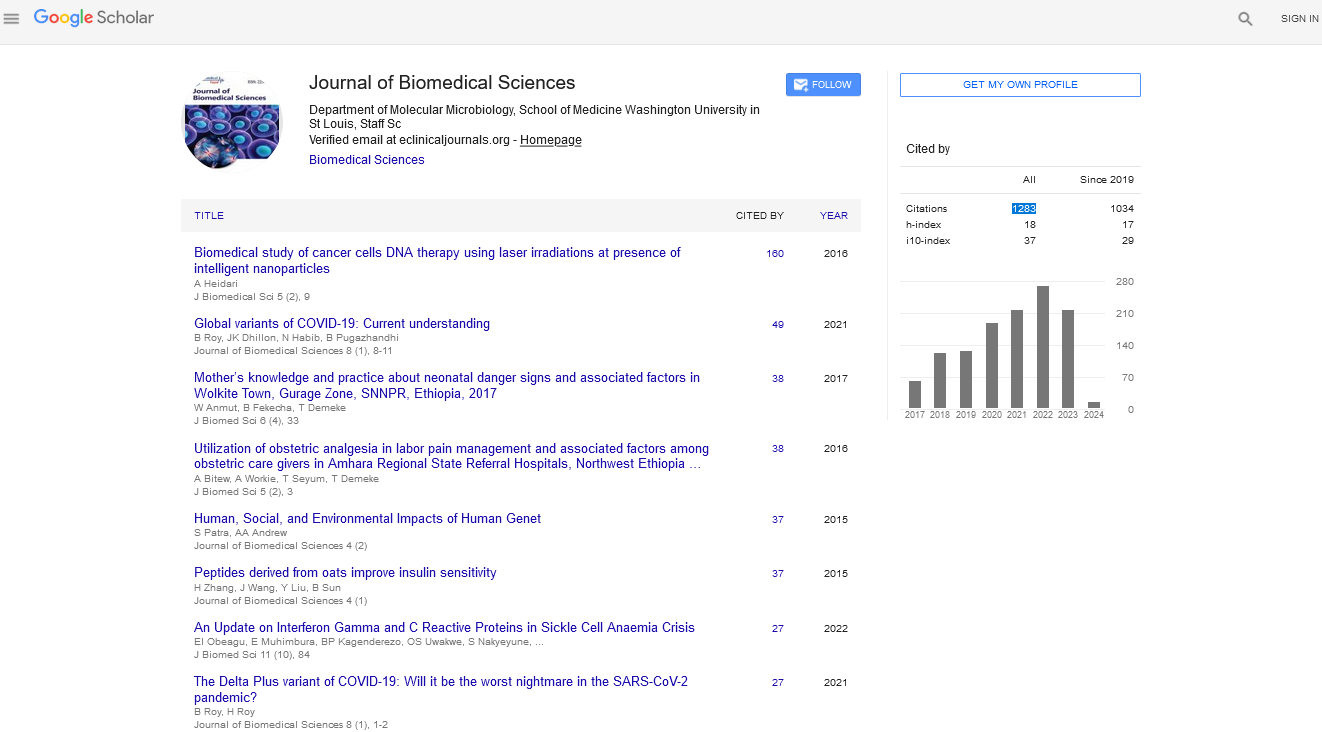Commentary - (2024) Volume 13, Issue 3
Exploring Gastroenterology: Understanding the Complexities of Digestive Health
Mieke Husin Lubis*
Department of Medicine, University of Amsterdam, Netherlands
*Correspondence:
Mieke Husin Lubis, Department of Medicine, University of Amsterdam,
Netherlands,
Email:
Received: 15-May-2024, Manuscript No. IPJBS-24-14871;
Editor assigned: 17-May-2024, Pre QC No. IPJBS-24-14871 (PQ);
Reviewed: 31-May-2024, QC No. IPJBS-24-14871;
Revised: 10-Jun-2024, Manuscript No. IPJBS-24-14871 (R);
Published:
17-Jun-2024
Description
Gastroenterology is a medical specialty that focuses on the digestive system and its disorders. It encompasses a wide range of conditions affecting the Gastrointestinal (GI) tract, including the esophagus, stomach, small intestine, large intestine (colon), liver, gallbladder, and pancreas. From common ailments like acid reflux to life-threatening diseases such as colorectal cancer, gastroenterologists play a crucial role in diagnosing, treating, and managing various gastrointestinal conditions.
The importance of gastrointestinal health
The digestive system is responsible for breaking down food into nutrients that our bodies can absorb and use for energy and growth. Any disruption in this process can lead to a variety of symptoms and health problems. Gastrointestinal disorders can affect people of all ages and backgrounds and may range from mild and manageable to severe and debilitating.
Common gastrointestinal conditions
Gastroesophageal Reflux Disease (GERD): GERD is a chronic condition in which stomach acid flows back into the esophagus, causing heartburn and other symptoms. It can lead to complications such as esophagitis, strictures, and Barrett's esophagus if left untreated.
Peptic ulcers: Peptic ulcers are sores that develop on the lining of the stomach, small intestine, or esophagus. They can be caused by factors such as infection with Helicobacter pylori bacteria, excessive use of Nonsteroidal Anti-inflammatory Drugs (NSAIDs), or excessive alcohol consumption.
Inflammatory Bowel Disease (IBD): IBD is a group of inflammatory conditions of the colon and small intestine, including Crohn's disease and ulcerative colitis. Symptoms may include abdominal pain, diarrhea, rectal bleeding, weight loss, and fatigue.
Irritable Bowel Syndrome (IBS): IBS is a functional gastrointestinal disorder characterized by abdominal pain or discomfort and changes in bowel habits without any evidence of underlying damage. It is a chronic condition that can significantly impact a person's quality of life.
Gallstones: Gallstones are hardened deposits that form in the gallbladder, often causing pain and other symptoms. They can lead to complications such as inflammation of the gallbladder (cholecystitis) or blockage of the bile ducts.
Liver diseases: Liver diseases, such as hepatitis, fatty liver disease, and cirrhosis, can result from various causes, including viral infections, alcohol abuse, and autoimmune conditions. These conditions can lead to liver failure if not properly managed.
Diagnostic tools and treatment options
Gastroenterologists utilize a variety of diagnostic tools to evaluate and diagnose gastrointestinal conditions. These may include endoscopy, colonoscopy, imaging studies (such as CT scans and MRI), blood tests, and stool tests. Once a diagnosis is made, treatment options vary depending on the specific condition but may include medications, lifestyle modifications, dietary changes, and surgical interventions.
For example, GERD may be treated with Proton Pump Inhibitors (PPIs) to reduce stomach acid production, while IBD may require anti-inflammatory medications or immunosuppressants to manage inflammation. In some cases, surgery may be necessary to remove diseased tissue or repair damage to the digestive tract.
Preventive measures and lifestyle changes
Maintaining good digestive health involves adopting healthy habits and making lifestyle changes that support optimal gastrointestinal function. This includes:
Eating a balanced diet rich in fruits, vegetables, whole grains, and lean proteins.
Avoiding trigger foods that can exacerbate gastrointestinal symptoms, such as spicy or fatty foods for individuals with GERD or IBS.
Limiting alcohol consumption and avoiding tobacco use, as both can contribute to digestive disorders and liver disease. Managing stress through relaxation techniques, exercise, and adequate sleep, as stress can exacerbate symptoms of many gastrointestinal conditions.
Seeking regular medical care and screening for conditions such as colorectal cancer, especially for individuals with risk factors such as a family history of the disease.
The role of gastroenterologists in comprehensive healthcare
Gastroenterologists are highly trained physicians who specialize in the diagnosis and management of gastrointestinal disorders. They work closely with other healthcare providers, including primary care physicians, surgeons, dietitians, and oncologists, to provide comprehensive care for patients with digestive health issues.
In addition to treating existing conditions, gastroenterologists also play a crucial role in preventive care, educating patients about the importance of healthy lifestyle habits and screening for diseases that affect the digestive system. Early detection and intervention can often lead to better outcomes and improved quality of life for patients with gastrointestinal conditions. Gastroenterology is a multifaceted field that encompasses the diagnosis, treatment, and management of a wide range of digestive disorders. From common ailments like acid reflux and peptic ulcers to more serious conditions such as inflammatory bowel disease and liver disease, gastroenterologists play a vital role in helping patients maintain optimal digestive health.
By promoting healthy lifestyle habits, providing timely screenings, and offering advanced treatments, gastroenterologists contribute to the overall well-being of their patients and help them lead healthier, more fulfilling lives. As our understanding of the digestive system continues to evolve, so too will the field of gastroenterology, offering hope for improved outcomes and better quality of life for individuals with gastrointestinal conditions.
Citation: Lubis MH (2024) Exploring Gastroenterology: Understanding the Complexities of Digestive Health. J Biomed Sci Vol:13 No:3





